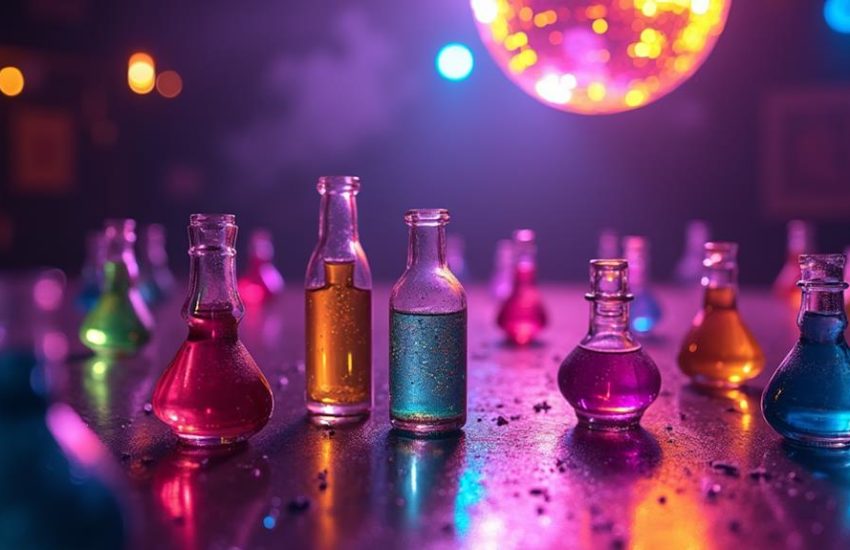Poppers: Everything You Need To Know & Current Controversies. How Can Poppers Be Defined?
How Can Poppers Be Defined?
Popper is the generic name for certain chemicals administered by inhalation. They used to be sold in glass vials that made a popping sound when crushed, hence the name.
Chemically, they are substances consisting of nitrites (esters of nitrous acid combined with alcohol, sodium nitrite and sulfuric acid). In general, the 3 best known compounds within this group are: amyl nitrite, butyl nitrite and isobutyl nitrite.
These substances are very similar and differ only in the number of carbons present in the structure and their spatial arrangement. Physically, they are almost transparent liquid substances, which are easily volatile and can be inhaled. To make them more attractive, they usually add very intense fruity scents.
Popper’s Origins
Originally, the use of amyl nitrate was purely medicinal. Amyl nitrate is a drug that was used for heart diseases, such as angina (which is a discomfort or pain in the chest that happens when not enough oxygen-rich blood reaches the muscle cells of the heart).
Amyl nitrates increase blood flow in the coronary arteries, and make it easier for the heart to pump blood to the rest of the body, hence its use for heart diseases.
Lastly, Poppers were also used as an antidote for Cyanide poisoning.
What Are The Desired Effects In Poppers?
Their main effect is vasodilatation. They relax the smooth muscle surrounding the blood vessels, especially in the head and neck area, resulting in an increase in blood flow: Nitrites are able to act on almost all non-vascular smooth muscle fibers in the body. Poppers also relax smooth muscles in the body, including those in the anus and vagina.
Consumers use this effect to increase pleasurable sensory stimulation. Its vasodilatory effect, by increasing blood flow, leads to an increase in heart rate and sensations of dizziness, vertigo, and euphoria. These are the effects that cause a decrease in inhibitions and an increase in sexual desire.
The main effects sought with its consumption are mainly found in the sexual sphere: It increases libido, produces a state of lethargy, well-being and relaxation of the sphincters. These effects subside quickly and can lead to a feeling of exhaustion.
Side effects
Like any chemical substance or drug, it has adverse effects. These can range from mild and temporary to the death of the user. Poppers definitely pose some health risks.
Most common ones are skin irritation around the nose, skin rashes (flushing of face and neck), fast pulse, headaches, nausea or vomiting, dizziness or lightheadedness, and serious drop in blood pressure.
It may also have harmful consequences on vision, especially optical changes and temporary vision loss, informed by scientific studies such as “33 Davies, A. et al. (2012). Adverse ophthalmic reactions in poppers users: Case series of ‘poppers maculopathy’. Eye (London), vol. 26, no. 11, pp: 1479-1486. 34 Pece, A. (2004). Transient visual loss after abuse of isobutyl amyl nitrite. Seminars in Ophthalmology. vol.19, n° 3-4, pp: 105-106. 35 Idem. Lounge 36”.
These symptoms can worsen to serious hypotension, syncope, respiratory failure, methemoglobinemia (in this disease, red blood cells are able to carry oxygen but cannot deliver this molecule to the tissues that need it), myocardial infarction, cerebrovascular accidents, and death.
What Happens If Poppers Are Combined With Other Substances?
Since poppers are consumed recreationally to increase the sensation of pleasure, their combination with other substances such as alcohol, psychoactive substances and drugs, especially vasodilators (for example Sildenafil), is very common.
This combination is highly dangerous and adverse effects may include death. Drinking poppers instead of inhaling them is also very dangerous and can lead to death.
The adverse effects may vary from person to person and depend on the condition of the particular organism. It is therefore impossible to guarantee that the effects will always be mild or “not happen to you”.
Long-Term Effects
Poppers produce tolerance (larger amounts start to be needed to achieve the same effect), which, together with the short duration of action, makes them a dangerous drug with a high risk of poisoning from overdose.
The popper is a psychological addiction rather than a biological one, since the person has to constantly consume a large amount to develop it, and it quickly becomes an habit.
Psychiatrists suggest that in the long run poppers can also cause mood disorders, anxiety disorders, social phobia, attention deficits, hyperactivity, paranoia, obsessive-compulsive disorder, aggressive behavior and psychiatric disorders.
Is It Legal To Use Poppers?
At the international level, there are no specific measures to regulate the widespread use of these inhaled substances, which can be found in freely available, commonly used products such as cleaners for technical elements, room fragrances, leather cleaners, and liquid incense. This is a way to disguise their use and circumvent the law.
Due to its role and the fact that it is a substance with medicinal-therapeutic properties, the control of amyl nitrates varies worldwide. According to the European Monitoring Center for Drugs and Drug Addiction, these substances are controlled, for example, in Sweden, which since 1997 has regulated the acquisition of amyl nitrites according to a method similar to that of a medical prescription.
Portugal, France, and the United Kingdom have no restrictions on the use of these substances. In Spain, its marketing is prohibited. In Australia, on the other hand, it was decided not to regulate these substances as if they were a drug.
In America, they are described as follows in 2019 “AMERICAS DRUG USE REPORT”: Many inhalants are common household items and are readily available. Although inhalants are not illegal drugs, because of their highly addictive potential and because they are used with other drugs, they are scrutinized with similar parameters as illegal drugs”.
Impacts Of The Lack Of Regulation
This diversity in the regulation of the substance, together with its wide availability for other uses (medicines, air fresheners, detergents) and its relatively low cost, are the facilitating factors for its use.
The risk of the legal vacuum and the lack of uniform criteria worldwide is used for the spread of informal markets that are deregulated and contain adulterated products. This can be seen in the proliferation of Internet sales on websites without any control, advertising new formulas whose prices vary incredibly in different countries. Especially between Europe and Latin America. The Importance Of “Hype Marketing”
Poppers have a safety facade that is widely used in their sale. Believing that they are substances that do not affect the central nervous system, they are sold as “safe drugs” that minimize their effects on the autonomic nervous system.
They are often packaged in the same bottles as energy shots/drinks and have attractive names like: Rush Super Rush, Jungle Juice, Locker Room Sub-Zero Iron Horse.
Conclusion: Lots Of Questions, Not So Many Answers
Finally, we have to ask ourselves: who controls the substances in the colorful bottles with funny names? What exact concentration of nitrites do they have? Have the long-term effects been reliably studied, especially the psychiatric and carcinogenic ones? How safe is it to inhale this substance? How do you know what adverse effects you might experience?
Keep in mind that the advertisements for these substances only highlight smooth muscle relaxation as a positive effect, but that is not the only one it can cause.

